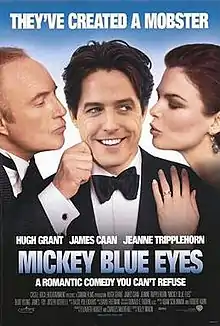Mickey Blue Eyes
Mickey Blue Eyes is a 1999 romantic comedy crime film directed by Kelly Makin. Hugh Grant stars as Michael Felgate, an English auctioneer living in New York City who becomes entangled in his soon-to-be father-in-law's mafia connections. Several of the minor roles are played by actors later featured in The Sopranos.
| Mickey Blue Eyes | |
|---|---|
 Theatrical release poster | |
| Directed by | Kelly Makin |
| Produced by | Elizabeth Hurley Charles Mulvehill |
| Written by | Adam Scheinman Robert Kuhn |
| Starring | |
| Music by | Basil Poledouris |
| Cinematography | Donald E. Thorin |
| Edited by | David Freeman |
Production company | |
| Distributed by | Warner Bros. Pictures (North America) Universal Pictures (International) |
Release date |
|
Running time | 102 minutes[2] |
| Country | United Kingdom United States |
| Language | English |
| Budget | $75 million[3] |
| Box office | $54,264,342[3] |
The film's title comes from Michael being forced to impersonate a gangster, who is spontaneously named "Kansas City Little Big Mickey Blue Eyes"; coincidentally, it is also a play on "Jimmy Blue Eyes," nickname of real-life mobster Vincent Alo.
Later on, the film served as an inspiration for an unofficial 2007 Bollywood adaptation, Welcome.
Plot
Michael Felgate is an English auctioneer living in New York City where he manages the Cromwell auction house. He proposes marriage to his girlfriend Gina Vitale, but is disheartened to be turned down. Gina tearfully explains that her father Frank and most of her cousins and uncles are gangsters deeply involved in a Mafia crime family, and she is concerned that Michael will be forced into their world. Michael assures her that he will not let this happen, but barely is their engagement party over before he is unwittingly involved in a money laundering scam, and soon the FBI takes an interest in him.
When one of the money laundering scams at Michael's auction house goes wrong, Gina's cousin Johnny confronts and attacks Michael. Gina takes his gun and fires a warning shot into the ceiling, which ricochets and accidentally kills Johnny. Johnny's father Vito finds out, and he tells Frank he will kill Gina unless Frank kills Michael during his wedding speech. Having grown fond of Michael, Frank confesses what Vito has ordered him to do to Michael and the two of them turn to the FBI in return for protection. The FBI set up an elaborate operation in which Michael's execution will be faked at the wedding reception. Michael is given a hidden recording device and is tasked with trying to record Vito into admitting his criminal activity on tape before he is "executed".
Michael's plan fails, and when Vito realises that his execution is a set-up, he orders Vinnie to kill Michael. Vinnie shoots Gina in what appears to be an accident. Vito is arrested for ordering Michael's execution. As Frank and Michael mourn Gina's apparent death in the back of her ambulance, it is revealed that her death was faked as well, and that Vinnie and Gina were also involved with the FBI as a back-up plan.
Cast
- Hugh Grant as Michael Felgate
- James Caan as Frank Vitale
- Jeanne Tripplehorn as Gina Vitale
- Burt Young as Vito Graziosi
- James Fox as Philip Cromwell
- Joe Viterelli as Vinnie D'Agostino
- Gerry Becker as FBI Agent Bob Connell
- Maddie Corman as Carol
- Tony Darrow as Angelo
- Paul Lazar as Ritchie Vitale
- Tony Sirico: gangster
- Vincent Pastore as Al
- Frank Pellegrino as Sante
- Scott Thompson as FBI Agent Lewis
- John Ventimiglia as Johnny Graziosi
- Margaret Devine as Helen
- Beatrice Winde as Mrs. Horton
Reception
The film earned $10,178,289 on its opening weekend, and went on to gross $33,864,342 in the US and a total of $54,264,342 worldwide.[4][5]
Reviews of the film were mixed. It currently holds a 45% approval rating at Rotten Tomatoes based on 76 reviews (34 positive, 42 negative). The site's consensus states: "High-brow humorists doing low-brow humor never hit their stride."[6]
Links to The Sopranos
The film is notable for the number of actors who would go on to appear in the HBO TV series, The Sopranos, including:
- Tony Sirico - Paulie Gualtieri
- John Ventimiglia - Artie Bucco
- Vincent Pastore - Sal "Big Pussy" Bonpensiero
- Aida Turturro - Janice Soprano
- Frank Pellegrino - Bureau Chief Frank Cubitoso
- Joseph R. Gannascoli - Vito Spatafore
- Burt Young - Robert "Bobby" Baccalieri, Sr.
- Tony Darrow - Lawrence "Larry Boy" Barese
Jeanne Tripplehorn went on to star in Big Love, which is also an HBO TV series.
The movie is mentioned by name in the episode D-Girl, when Amy Safir explains to Christopher Moltisanti that there isn't a demand for mob-related scripts because of this film.
See also
- Vincent Alo, a real-life gangster known as "Jimmy Blue Eyes"
References
- "Hugh Grant is feeling 'Blue'". CNN. Retrieved 2010-12-13.
- "MICKEY BLUE EYES (15)". British Board of Film Classification. 1999-07-30. Retrieved 2013-07-05.
- "Mickey Blue Eyes". Box Office Mojo. Retrieved October 15, 2010.
- "Company Town Film Profit Report". Los Angeles Times. Retrieved 2012-06-03.
- "Weekend Box Office". Los Angeles Times. Retrieved 2012-06-03.
- "Mickey Blue Eyes". Rotten Tomatoes. Retrieved January 30, 2012.